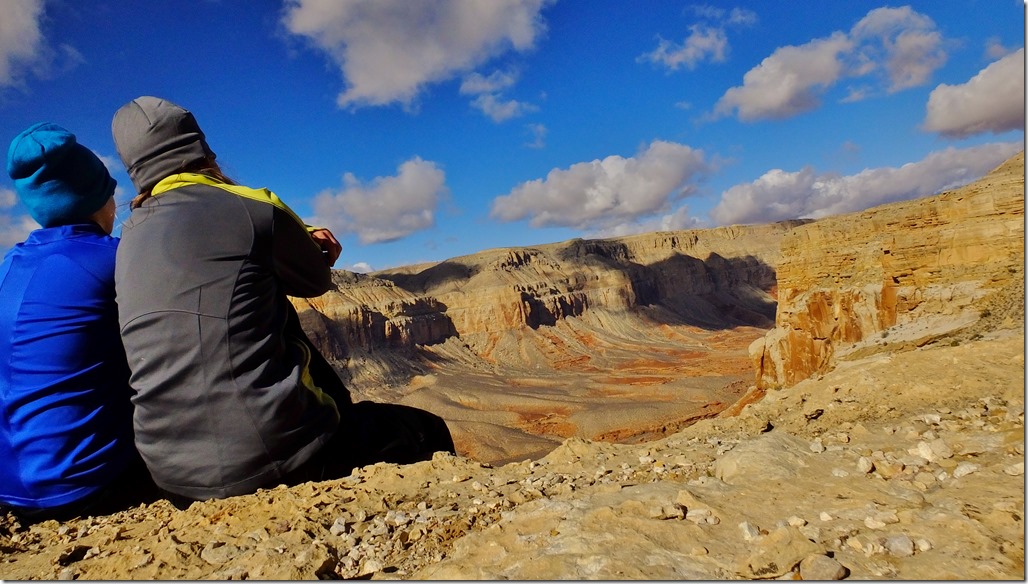“For most women, the language of conversation is primarily a language of rapport: a way of establishing connections and negotiating relationships” Deborah Tamen
Imagine rolling your knee minutes before the start of your dream hike?
Would you cancel your backpacking trip or soldier on?
Would you risk your personal safety because you cannot stomach the pending disappointment pill?
Would you try to convince your hiking partner that you can walk 24 miles on a bum knee?
Is it selfish to continue or selfless to cancel?
How do two strangers negotiate the inevitable?
Is negotiating something to be feared and avoided, or is it an everyday part of life?
Is it possible to negotiate an ending with the promise of a new beginning?
How does one say “NO” without denying a “YES?”
These are some of the questions I pondered after Clarissa injured her knee. In my opinion, I felt it was not safe to venture down into the canyon with a 35 lb backpack. Granted she could helicopter out if needed, but why risk furthering an injury.
How do you tell the perfect stranger that we need to postpone our dream adventure?
Do you redirect her focus to the kayaking leg of the trip, or perhaps offer a substitute hike shorter in distance?
How do you reconcile an injury in the outdoors?
In many ways I feel it’s like fast tracking grief. Denial, Anger, Bargaining, Depression, and Acceptance are the five emotional stages of grief that Dr Elizabeth Kubler Ross accurately described in her book, “On Death and Dying”. These five emotional stages can be applied to all realms of loss, including injuries in the outdoors.
Denial – for the most part is imagining a false yet preferable reality. “My knee is not that bad; I can do this backpacking trip.”
Anger – the moment when you realize the denial cannot continue, and the frustration builds leading to anger. “It’s risky, but I have come all this way and I don’t want to leave empty handed.”
Bargaining – can feel like extended periods of unrealistic hope. “I can lighten my pack, perhaps helicopter out, I can wrap my knee, maybe even ice it in the river.”
Depression – for hikers it could mean being saddened by certainty. “My knee injury will not permit me to complete our backpacking trip.”
Acceptance – facing the inevitable. “So we won’t be backpacking this trip, rain check?”
As a team we discussed the options during our cliffside pow wow. Disheartened and extremely disappointed, we both agreed to a short day hike.
On a positive note, Clarissa’s knee injury demonstrated our communication and problem solving skills. Our resolution was fueled by respect and motivated by mindfulness. The outcome could have been much different had we both lacked in emotional intelligence.
How often have you found yourself in situations where a friend or colleague is unable to reason, manage and understand their emotions?
Have you ever noticed that many people struggle to express their feelings in a non-shaming/blaming manner?
Even worse, have you ever encountered a loved one who was incapable of understanding, interpreting, and responding to the emotions of others?
How does one learn or develop their social and emotional intelligence?
Do we assume that a human’s ability to cope with emotions is innate, a matter of temperament, or somehow magically acquired?
Do we place more value on intellect as opposed to emotional IQ?
Is our education system lacking by not teaching or testing emotional literacy?
Is it realistic to expect a child to learn with unregulated emotions?
I feel emotions can either enhance or hinder our ability to learn. In the second grade my teacher told me to calm down. How do you calm down when you’re feeling anxious?
Where do kids learn the skills to manage feelings? Many children never learn the crucial skill off emotion regulation, let alone develop their emotional IQ.
Is it academic intellect or emotional literacy that will determine a child’s adult employment, health and interpersonal relationships?
Could emotional literacy be the missing piece that limits and robs adults of happier more peaceful lives?
I was one of those kids who never developed emotional intelligence; however, I was born with an innate sense of resilience. It wasn’t until my late 20’s that I realized I had no clue how to express resentment, anger, or even joy for that matter. Fortunately, over the years I have developed my emotional IQ; otherwise, our pow wow conversation might have been rather disastrous.
In honor of our commitment to friendship, the perfect stranger and I headed down into the canyon. Granted it was a short hike; however, the views were nothing short of spectacular.
Once again, we found ourselves enjoying the solitude of the canyon; sharing it with no one except ourselves. I treated Clarissa to an occipital and foot massage. Who gets massaged with a backdrop like this? The perfect stranger does!
In a few hours, we would be on the road again, bound for Laughlin, Nevada. I will always consider this spot Massage Point, and the place where I met someone who was emotionally available.










Beautiful. Great questions. I had to bail 3 days short of my 33 day trek on the Sierra High Route last summer. One friend was not happy. I bailed anyway. “I’m fried,” I said. We returned 2 weeks later with my back and spirit healed and completed it.
LikeLike
Yes, its always difficult anticipating how adventure buddies will respond to the inevitable! Glad you were able to return, and complete the High Sierra Route. It’s on my list!
LikeLike
If you want to know more about Hinkley, CA 92347 go to: http://www.contaminatedrealty.org One of the most high profile lawsuit’s cases in USA
LikeLike